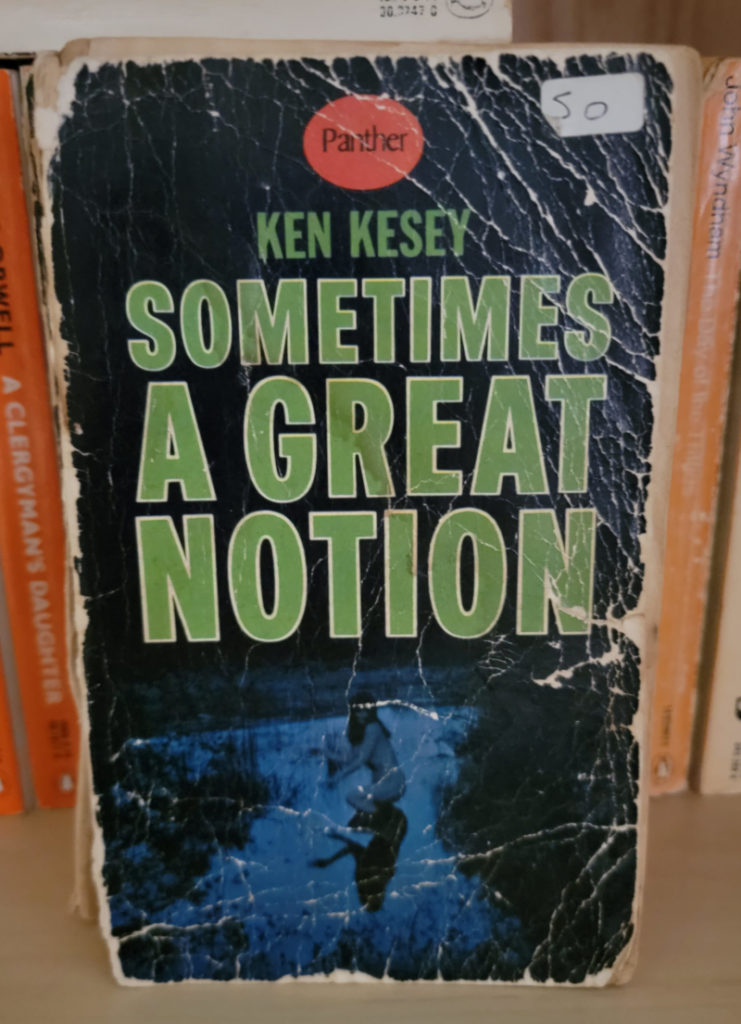Way back when, I went through a phase of reading a lot of ‘beat’ literature. I read Jack Kerouac, William Burroughs, Tom Wolfe’s Electric Kool Aid Acid Test, Robert M Pirsig’s Zen And The Art of Motorcycle Maintenance, and then moved on to Ken Kesey. This wasn’t really ‘beat’, but Kesey was one of The Merry Pranksters, and he wrote One Flew Over The Cuckoo’s Nest, which I read (before seeing the movie) and loved. The second book I picked up of his was Sometimes A Great Notion, and this was really not what I expected. But it changed me in ways that The Electric Kool Aid Acid Test didn’t.

It’s a big, rambling book, covering decades, and filled with fascinating characters and prose that’s a joy to read. Ostensibly, it’s the story of a hard-grift logging family in Oregon dealing with a logging strike, but that’s to sell it woefully short. Surprisingly, it’s not a particularly well-known (or popular) book (they did make a movie of it, but I don’t want to watch it, in case it ruins the book for me) but for me it’s right up there with the great works of English literature (in my Top 3, apparently…).
What I took away from the novel is probably not what Kesey intended, but it was a strong moral compass – or, specifically, the drive to do the right thing. To really do the right thing – not what you think is the right thing at the time, or something that you feel compelled to do, but the thing that is truly the right thing to do. Or maybe it is more that it has allowed me to see when a specific course of action would be the wrong thing, no matter how right it feels at the time. For me, it’s about what you do in circumstances – usually of your own making – where you feel you’re being inexorably drawn into a certain path of action, and being swept along with the tide, towards a certain seemingly-natural conclusion. And it’s the importance of being able to stop, look honestly at what is happening, and choosing to change course.
This isn’t necessarily a split-second decision, or a rash choice made on the spur of the moment. Like Sometimes A Great Notion itself, these inexorable paths we find ourselves on can be months, or even years, in the making. It could be a specific decision you’ve made, in response to something that has happened, but that takes a while to come to fruition, or it could be a slow build-up of resentments that pile on top of each other, snowballing, and gathering speed over time. The point is that eventually you’ll feel like you have no choice but to follow through to the inevitable conclusion.
What Sometimes A Great Notion has taught me, is how to recognize when that is happening. Not necessarily at the outset – more often, only when you discover you are hurtling along the path and realize that your feet are slipping and you no longer have a grip on the situation. It’s at that exact point you need to dig deeper, and alter your course. Sometimes that involves sticking a branch in the spokes of the bike you’re furiously pedaling and coming to a painful, crashing halt, but sometimes inaction is the best action, and you just need to stop everything, even if this means fighting against a momentum that seems impossible to overcome.
I know all of this sounds very vague, and nebulous. And it is deliberately so, because I don’t want to ruin the book for anyone who has yet to read it. And I would encourage everyone to read it – although I fear it may not elicit the same reaction in you as it did in me; my reaction to it may have been a product of my headspace and situation at the time, as much as it was to Kesey’s story. But reading it changed me. I have, since reading it, found myself on that runaway train (or slow, and steady march) to an apparently foregone conclusion of performing a certain action, and have managed to jump the tracks and avoid what was almost certainly a painful outcome (morally, if not physically). And I’ve done that by drawing on my connection to Sometimes A Great Notion, and looking for what is actually the right thing to do, and not just what I think is the right thing to do.
They say that dropping acid permanently changes the pathways in your brain. That’s undoubtedly true, but sometimes reading the right book can do the same thing. And for me, reading Sometimes A Great Notion was that book. It permanently changed my brain and my thought processes. I don’t know that what I took from the book is necessarily the point Kesey was trying to make (maybe that’s the mark of a great book, that people can interpret it in different ways, and be individually enriched), but Sometimes A Great Notion was my ‘acid test’, and I was never the same again.

Leave a Reply